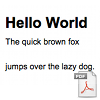Here is how we make a PDF output ready app thanks to the fpdf library included with web2py
An FPDF web2py silly report
Copyright (C) 2013 Alan Etkin
This program is free software: you can redistribute it and/or modify
it under the terms of the GNU Affero General Public License as published by
the Free Software Foundation, either version 3 of the License, or
(at your option) any later version.
This program is distributed in the hope that it will be useful,
but WITHOUT ANY WARRANTY; without even the implied warranty of
MERCHANTABILITY or FITNESS FOR A PARTICULAR PURPOSE. See the
GNU Affero General Public License for more details.
You should have received a copy of the GNU Affero General Public License
along with this program. If not, see <http://www.gnu.org/licenses/>.
This license note applies only for the recipe below. For web2py or fpdf
licenses refer to http://code.google.com/p/web2py and
http://code.google.com/p/fpdf
The dummy db (change with your own model):
db.define_table("person",
Field("name"), format="%(name)s")
db.define_table("dog",
Field("name"),
Field("owned_by", "reference person"))
if db(db.person).count() < 1:
for name in (("Bartolomé Mitre", "Mendieta"),
("Julio Argentino Roca", "Diógenes"),
("Domingo Faustino Sarmiento", "Juan"),
("Terry Gilliam", "Spam")):
owned_by = db.person.insert(name=name[0])
db.dog.insert(name=name[1], owned_by=owned_by)
# we change the scaffolding model a bit because of this issue
# html: http://code.google.com/p/web2py/issues/detail?id=1338
# the code below is a modified version of the function at
# gluon.contrib.generics
def pyfpdf_from_html(html):
import os
from gluon.contrib.fpdf import FPDF, HTMLMixin
def image_map(path):
if path.startswith('/%s/static/' % request.application):
return os.path.join(request.folder,
path.split('/', 2)[2])
return 'http%s://%s%s' % (request.is_https and 's' or '',
request.env.http_host, path)
class MyFPDF(FPDF, HTMLMixin):
pass
pdf = MyFPDF()
pdf.add_page()
pdf.write_html(html, image_map=image_map)
return XML(pdf.output(dest='S'))
A little customization of views/generic.pdf (make a backup of the original file if you want, i.e. as generic.pdf.original)
{{
import os
# we comment this as we are using a custom model function
# from gluon.contrib.generics import pdf_from_html
filename = '%s/%s.html' % (request.controller,request.function)
if os.path.exists(os.path.join(request.folder,'views',filename)):
html=response.render(filename)
else:
html=BODY(BEAUTIFY(response._vars)).xml()
pass
# note the pyfpdf instead of pdf in the function call
=pyfpdf_from_html(html)
}}
Now our featured view (default/dogs.html):
{{def text(atext):
return atext.decode("utf-8").encode("latin-1")
}}
{{=HTML(BODY(IMG(_src=URL(c="static", f="images/fpdf.png")),
BR(), BR(), BR(), BR(),
TABLE(THEAD(TR(TD("Dogs", _width=200),
TD("Owners", _width=400))),
TBODY(*[TR(TD(text(dog.name), _width=200),
TD(text(dog.owned_by.name),
_width=400))
for dog in dogs]))))}}
Note that you must add a static/images/fpdf.png file to your app or you'll get a path error ticket
And finally a controller without a tape recorder up his nose (default.py):
def dogs():
dogs = db(db.dog).select()
return dict(dogs=dogs)







Comments (1)
0
andrew-willimott-10653 10 years ago
Great Post, thanks.
Is there a reason why the fix for def pyfpdf_from_html hasn't been made to the base web2py app ? This isn't just a change to the scaffolding app, it changes the contrib part of web2py. Do the allowed tags need to be aupdated ?